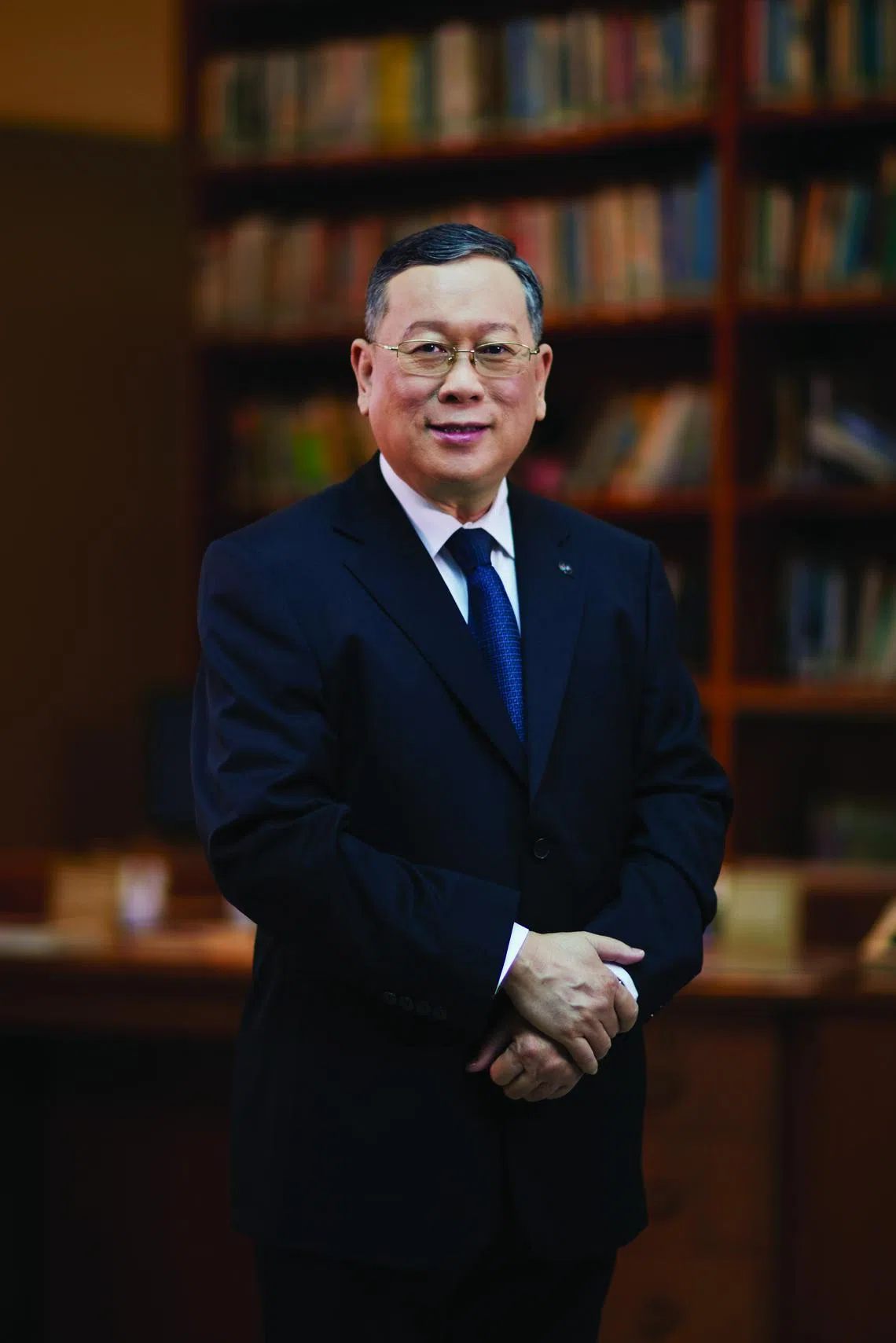At SIM, where everyone can learn for life and thrive for life
For over 60 years, the not-for-profit institution has stayed committed to developing and maximising potential through accessible and flexible learning paths
SIXTY-ONE years ago in 1964, the then-Economic Development Board provided seed funding of S$100,000 – no small amount, at the time – to establish the Singapore Institute of Management (SIM).
The aim of this new organisation was simple yet challenging: To help build up a newly independent nation with skilled managers who will play a vital role in growing the economy.
Over the decades, SIM has constantly adapted and evolved its offerings to meet the ever changing needs of the industry and the people, and today it is one of the region’s leading lifelong learning institutions.
SIM officially launched a rebranded identity in 2022 with the tagline “Learn for Life, Thrive for Life”, to reflect a new industry-focused and skills-based era of lifelong learning.
Trailblazing with a series of firsts
SIM began operations at EDB’s training unit at Fullerton Building, and moved to an office of a shophouse along South Bridge Road when the late Lien Ying Chow, founder of the now-defunct OUB, offered SIM the office space above his bank.
By mid-1966, just two years after SIM was established, more than 700 managers and supervisory personnel were attending SIM courses.
Navigate Asia in
a new global order
Get the insights delivered to your inbox.
One of SIM’s pioneering efforts in the 1970s was the introduction of certificated programmes in all aspects of management.
In 1973, SIM introduced Singapore’s first Diploma in Management Studies, a milestone at the time given that such a programme was not available at the country’s two universities then. More than 400 applications came in for just 50 available places.
In the years that followed, SIM launched Diplomas in Marketing, Human Resources, Accounting and Finance, which preceded Singapore’s introduction of the Skills Development Fund and the ongoing national push towards skills upgrading.
In 1985, SIM was the first to introduce foreign degrees in Singapore when it partnered with Henley Management College and Brunel University to introduce the part-time Master of Science in Management Studies programme.
This course opened the doors for senior executives to pursue a foreign advanced degree locally without interrupting their careers, marking a significant advancement in lifelong learning.
In 2005, SIM became the first private education institution (PEI) to run SIM University (UniSIM), which eventually became an autonomous university and renamed as the Singapore University of Social Sciences in 2017.
Purpose remains unchanged
Today, SIM is the largest PEI in Singapore with a 110,000-square-metre campus in Clementi.
It currently has 12 university partners from the US, UK, Australia, Europe and Canada like the University at Buffalo, University of Birmingham, University of London, Royal Melbourne Institute of Technology and University of Wollongong to name a few, with the latest addition being the University of Alberta, that provide a diverse range of learning pedagogies for learners with differing learning styles and preferences.
There are more than 500 employees on the payroll and around 16,000 enrolled learners from over 50 nationalities. SIM offers more than 140 academic programmes through its SIM Global Education arm, and over 300 executive and business programmes through the SIM Academy.
The man who’s spearheading SIM’s growth in this next chapter is Professor Wei Kwok Kee, who was appointed president and chief executive officer in April this year.
The 69-year-old researcher and scientist joined SIM in 2020 and has been an integral part of the Executive Management team since then.
Before arriving at SIM, he was the founding dean of the School of Continuing and Lifelong Education at the National University of Singapore.
He was also dean of the College of Business and head of the Department of Information Systems at the City University of Hong Kong. He had an earlier stint at NUS as the founding head of the Department of Information Systems.
“While our scale has grown, our purpose has remained unchanged for the past 60 years. We have always been committed to maximising and developing potential through accessible and flexible learning pathways,” says Prof Wei.
“Over 200,000 have walked through our doors. This enduring commitment has allowed us to continually contribute to Singapore’s workforce capabilities, build an inclusive and equitable society, and support enterprises in upskilling.”
Prof Wei says that SIM is now at a stage where he feels it’s time to integrate the Pre-Employment Training (PET) and Continuing Education and Training (CET) curricula – a move that will benefit learners of all ages, backgrounds and experience.
“To combine PET with CET, I think the concept is very powerful. You have students in our academic programmes who re exposed to industrial best practices, and then you have working adults who’ve been away from school for many years and can get the latest thinking from the academic perspective. It is mutually beneficial,” he says.
“We will continue to emphasise on just-in-time learning, and on helping enterprises to inject the latest market-required skills to their employees.”
Overseas presence
In 2018, SIM established its first regional office in Jakarta as part of a broader effort to bring the brand overseas. Today, SIM as an International Institute of Higher Learning has regional offices across Malaysia, Vietnam, India and Indonesia. An office was set up in China in 2019.
SIM’s Overseas Teaching Centres (OTCs), established in strategic partnerships with regional institutions, offer advanced academic programmes and professional certification courses. These centres enable learners to pursue quality education and earn globally accredited qualifications locally, expanding SIM’s reach and impact across the region. To date, SIM has successfully established 19 OTCs in Myanmar, China and Indonesia.
“By expanding our regional footprint through these centres, we become a catalyst for change – bridging skills gaps, fostering social mobility, and building future-ready workforces regionally,” says Prof Wei.
In Singapore, over a third (36 per cent) of full-time students are international students from over 50 countries. This has enhanced the diversity and vibrancy of the SIM community and reflects the institution’s global presence and impact.
Of the 16,000 students enrolled today, about 4,000 hail from China. Prof Wei shared that the growth rate from China is approximately 20 per cent every year – much higher than the approximated 2 per cent annual growth rate for students from South-east Asia.
“Many parents and students from China have a very good impression of Singapore, and that’s one reason why they choose to come here. Another reason is SIM’s university partners and their high rankings and strong reputation for quality and excellence,” he says.
Giving back
SIM has long maintained a culture of giving back to the community in different ways and nurturing the next generation of leaders.
As a not-for-profit organisation, SIM reinvests its profits back into its mission to help more learners. Last year, a total of S$1.4 million was disbursed in the form of scholarships, bursaries and awards.
In July 2024, SIM – in partnership with the family of the late founding chairman Richard K M Eu – launched the Dr Richard K M Eu – SIM Social Entrepreneurship Centre (RESSEC). This centre honours Dr Eu’s legacy by nurturing social entrepreneurs and strengthening collaborations within Singapore’s social service sector.
RESSEC offers postgraduate and professional development courses, including a bespoke Specialist Diploma in Social Entrepreneurship conducted by SIM. The Eu family donated S$6 million, with SIM contributing an additional S$2 million, to support the centre’s mission of fostering social entrepreneurship by nurturing innovators who address societal challenges and drive sustainable development.
At SIM’s 60th anniversary gala dinner in November 2024, the S$60 million SIM Impact Fund was launched. This initiative provides up to S$6 million in funding annually for the next 10 years in a bid to make learning opportunities more accessible for all, for all seasons of life, with or without the means.
As part of the SIM Impact Fund, SIM also pledged S$3 million in support of the President’s Challenge Fellowships (Springboard Track), symbolising the ongoing commitment to uplifting communities and empowering individuals beyond the learner community.
The SIM People Development Fund, which is the philanthropic and social good arm, serves the disconnected, disabled, displaced, and dependent sectors. One example is the Enabling Pathway Programme which helps persons with disabilities enhance their employment outcomes.
“We are an international institute of higher learning that does good, catalyses good, and promotes good. That is our purpose for being, helping individuals and organisations become the best version of themselves,” says Prof Wei.

Milestones over the decades
1964: SIM is established with seed funding from the Economic Development Board.
1973: Introduced Singapore’s first Diploma in Management Studies, in collaboration with the University of Singapore, Nanyang University, Singapore Polytechnic and Ngee Ann Polytechnic.
1979: Introduced the Diploma in Personnel Management.
1985: Partnered Henley Management College and Brunel University to introduce Singapore’s first foreign degree, the part-time Master of Science in Management Studies.
1986: Collaborated with the University of London to offer a full-time Bachelor of Science (Economics) in Management Studies.
1987: The Royal Melbourne Institute of Technology becomes SIM’s second foreign university partner.
1993: Launched the Open University Degree Programme (OUDP) at the invitation of Singapore’s Ministry of Education, to provide working adults with accessible, part-time degree options.
2001: The Clementi campus was officially opened by then-deputy prime minister Tony Tan.
2005: SIM University (UniSIM) was established, making it Singapore’s first private university dedicated to adult learners.
2009: SIM topped Singapore’s Fastest Growing 50 companies list.
2012: MOE designated UniSIM as Singapore’s sixth autonomous university, aiming to expand university enrolment and diversify higher education options. This transition led to the introduction of full-time bachelor’s programmes in accountancy, finance, and marketing starting from 2014.
2017: UniSIM was restructured and rebranded as the Singapore University of Social Sciences, reinforcing its dedication to lifelong learning and supporting working adults. SIM is the only private education institution to have achieved this feat.
2018: Established first regional office in Jakarta, followed by Malaysia and India.
2022: SIM and UOB signed an MOU to establish the UOB Better U Campus, a corporate university designed to support UOB’s leadership and talent development initiatives.
2022: Underwent rebranding exercise to reflect an industry-focused and skills-based era of learning.
2024: Established the Dr Richard K M Eu – SIM Social Entrepreneurship Centre.
2024: Established the S$60 million SIM Impact Fund.

Copyright SPH Media. All rights reserved.
